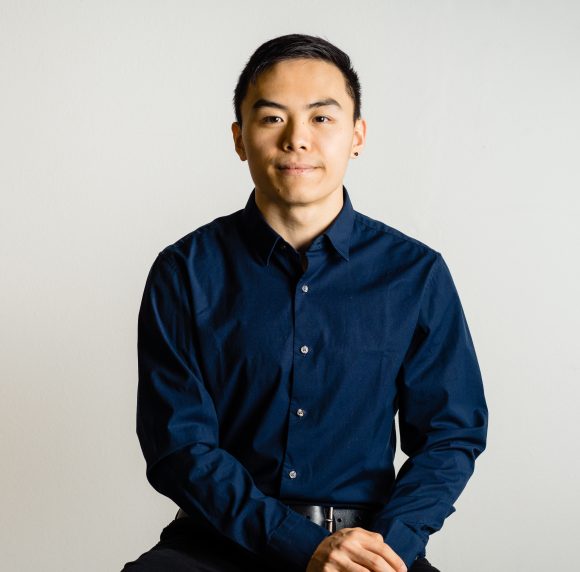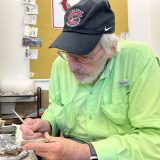Headed to CalTech with a NSF Graduate Research Fellowship Alumni Spotlight: Daniel Chang '19
April 17, 2020
 We are so excited to celebrate Daniel Chang ’19, who was recently awarded a National Science Foundation Graduate Research Fellowship (NSF GRFP)! The NSF GRFP recognizes graduate students in science, technology, engineering, and math who are pursuing further education in masters and doctoral programs. The fellows receive opportunities for international research and professional development, as well as an annual stipend to help with the cost of tuition and fees. Chang currently works at Chapman as a lab instructor for organic chemistry and as a full-time research assistant in the Liberman-Martin lab with Dr. Allegra Liberman-Martin.
We are so excited to celebrate Daniel Chang ’19, who was recently awarded a National Science Foundation Graduate Research Fellowship (NSF GRFP)! The NSF GRFP recognizes graduate students in science, technology, engineering, and math who are pursuing further education in masters and doctoral programs. The fellows receive opportunities for international research and professional development, as well as an annual stipend to help with the cost of tuition and fees. Chang currently works at Chapman as a lab instructor for organic chemistry and as a full-time research assistant in the Liberman-Martin lab with Dr. Allegra Liberman-Martin.
Originally from Portland, Oregon, Chang graduated from Chapman in 2019 with a degree in chemistry and a minor in computational science. While an undergrad, he served as a supplemental instructor/tutor, as well as gaining research experience as a research assistant. He will be attending graduate school at the California Institute of Technology (CalTech) in the fall, where he will be pursuing a Ph.D. in Chemistry with a focus in organic chemistry. He shared with us the involvement and research that set him up for success, as well as his current career plans.
Research Involvement
Undergraduate research is a hallmark of the Schmid experience. Chang took full advantage of the opportunity to conduct research as an undergrad student in order to learn about his interests and skills. He tells us, “As an undergrad, I started research in Dr. Warren de Bruyn’s lab during my second month at Chapman. I was able to do research every semester and summer of my undergrad career and completed 26 credits of research. My research experiences were in organic synthesis, analytical chemistry, & chemical education.” These experiences not only made Chang a competitive applicant for the fellowship program but also helped him narrow his interests as he looked to graduate research opportunities. “It was really great to experience a bunch of different kinds of chemistry in undergrad, but I’ve finally settled on pursuing research in organic synthesis!”
Headed to CalTech
At CalTech, Chang will be focusing his research primarily on the development of new catalytic organic reactions. Beyond working in the lab, he’s looking forward to meeting other students with his same interests. “I’m mostly excited to be surrounded by other people that are just as excited about organic chemistry as I am! During my visit to Caltech, I really enjoyed interacting with faculty and graduate students, so I am really excited to get to know them all better.”
After he completes his Ph.D., Chang hopes to become a professor. “I really like mentorship, teaching, and research, so I feel that this would be the ideal job for me!”
Tips for Your Application
Grant and fellowship programs like the NSF GRFP are incredibly competitive, and the application process can be time-consuming and difficult. Chang drew upon his relationships at Chapman and the Center for Undergraduate Excellence to learn more about the process and to help with mentorship. He decided to apply for the program when he realized he wanted to pursue a Ph.D. during his junior year as an undergraduate.
Once Chang decided to apply for the program, he got to work right away. He explained that he started writing his personal statements and asking for letters of recommendation in the fall.
For other students who are interested in applying to similar fellowships, Chang has a few recommendations:
- “Pay attention to the review criteria.” Chang says applicants should make sure they highlight involvements that fit into the categories of the program. He also explained that applicants should be excited about the experiences they are highlighting. “You also don’t want to be doing things just to check off a box. Do things that you are excited about; it will really show in your personal statement.”
- “Think about the research project you want to propose early.” Chang started reading literature in the summer before he applied to the fellowship program to figure out an idea that was missing from the literature (finding something new) and which of his ideas would actually be viable.
- “Take Dr. Kim’s seminar course on applying to graduate school.” Dr. Christopher Kim’s class focuses on the application process both for graduate school and for programs like the NSF GRFP and sets deadlines for students to hold themselves accountable.
By drawing on his experiences at Chapman and reaching out to his connections, Chang was able to stand out to the NSF committee. He says, “It’s a huge honor to be recognized nationally because my peers are really amazing. I had the chance to meet a lot of students in the incoming class of chemistry Ph.D. students and current Ph.D. students that applied for this fellowship on graduate school visit weekends, and everyone is super bright, so I know the competition was tough. I feel really grateful to receive this fellowship, and I am excited for the future!”
Special Thanks
Chang wanted to thank the faculty members who have supported him through the beginning of his research career and his application process. “I had an amazing support network of peers, mentors, friends, and family that helped me throughout my time as an undergrad. My parents are the best and have always been so supportive of me.”
He also was helped by faculty in the Chemistry and Biochemistry departments. He credits Dr. de Bruyn for his first research experience that helped spark his interest in a research career. Dr. Elaine Schwartz helped him with his writing skills, and Dr. Justin O’Neill exposed him to research in organic synthesis.
He is particularly grateful to his current research advisor, Dr. Liberman-Martin. He says, “They are an amazing scientist, and I really like the way they approach chemistry, but more importantly, I think they are an amazing mentor. They are hands-on when needed, but they are also willing to let me work independently when I think that I have things under control. I feel that my abilities to drive a project, think about chemistry, and conduct experiments have improved immensely just during this year, and they played a huge role in that development. There is still a lot for me to learn, but I feel much more confident going into grad school with a year of experience in their lab.”
He also thanks Dr. Elizabeth Jarvo at University of California, Irvine, whose lab he worked in during the summer, and who helped with his fellowship application.
Chapman also had three students named for honorable mention for the NSF GRFP. Congratulations to Ari Jong ’16, William Parker ’18, and Jesse Rush ‘19!
If you are interested in learning more about the NSF Graduate Research Fellowship Program, click here! The Center for Undergraduate Excellence also has more resources about fellowships, grants, and research opportunities for undergraduate and graduate students.

